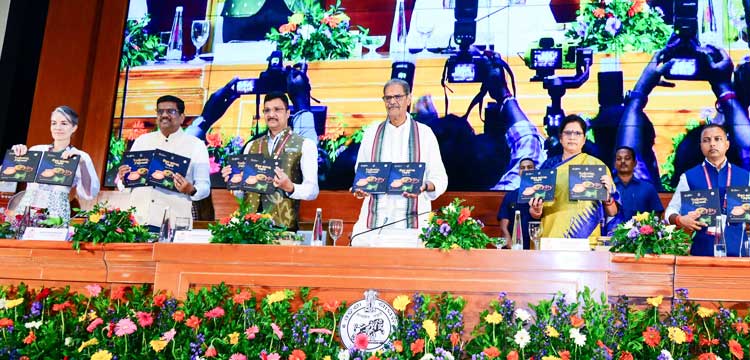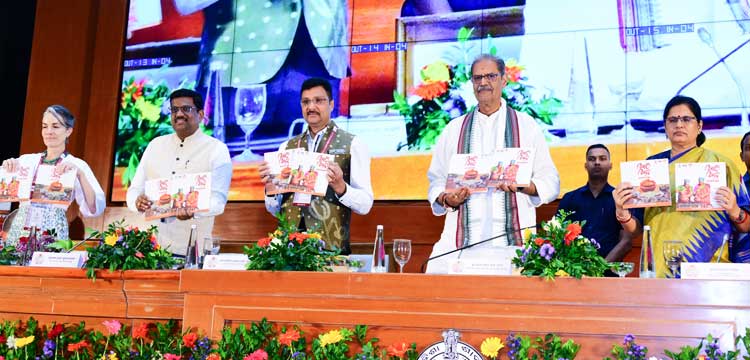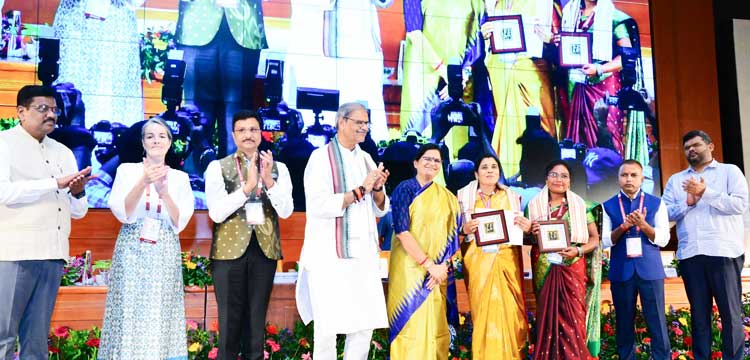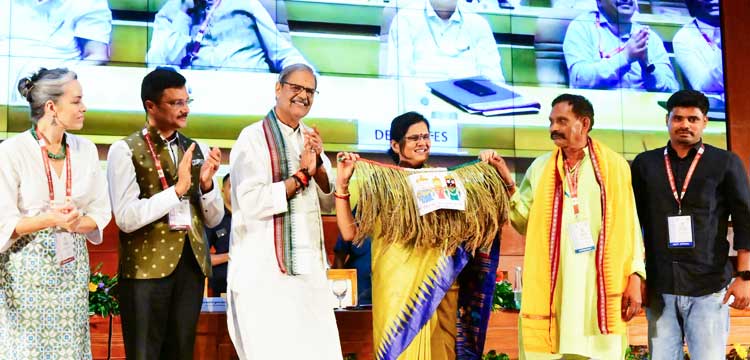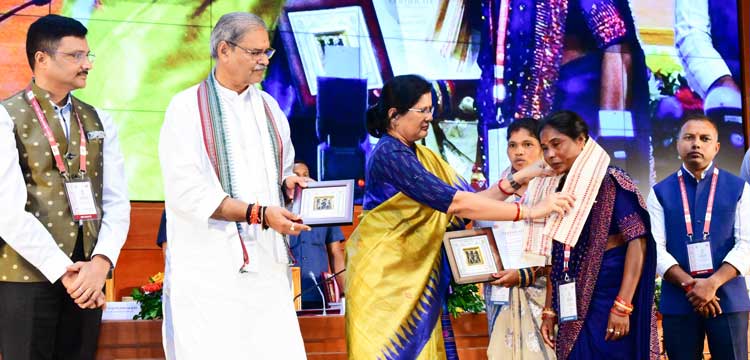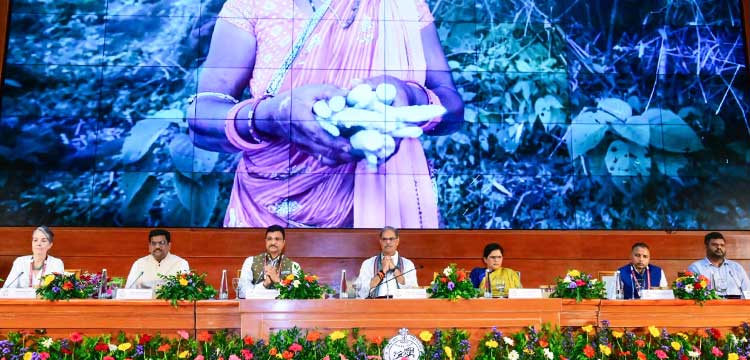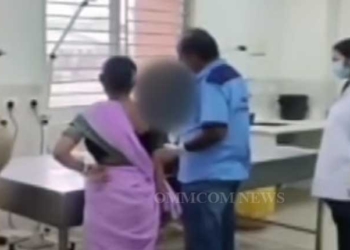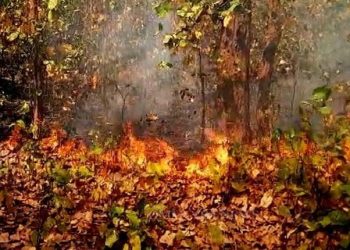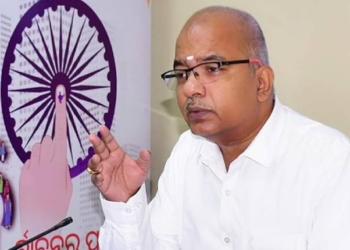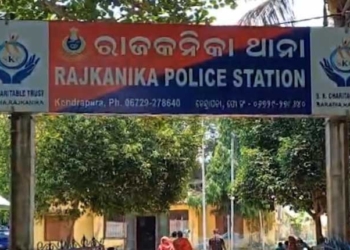Bhubaneswar: The two-day International Symposium on Shree Anna & Forgotten Foods (ISSFF), organized by the Department of Agriculture and Farmers’ Empowerment, Government of Odisha, at Lok Seva Bhavan, Bhubaneswar, concluded with commendations and valuable suggestions from state, national, and international participants.
These discussions aimed at creating a roadmap for promoting Shree Anna (millets) and other neglected crops in Odisha.
Addressing the gathering, Kanak Vardhan Singh Deo, Deputy Chief Minister and Minister of Agriculture, Farmers’ Empowerment, and Energy, Government of Odisha, stated, “Smt. Pravati Parida, Hon’ble Deputy Chief Minister of Odisha (Minister of Women and Child Development, Mission Shakti, and Tourism), distinguished guests, and colleagues, thank you for joining the closing ceremony of the International Symposium on Shree Anna and Forgotten Foods. Over these two days, we have reaffirmed our commitment to reviving resilient, traditional crops. Let us carry forward the insights gained here to strengthen sustainable agriculture and food security for Odisha and beyond. Thank you.”
Deputy Chief Minister Pravati Parida, remarked, “Millets, or Shree Anna, are more than a food source—they are our heritage and our future. To see them flourish again, we must bring them back to every family’s plate. Women, especially mothers, are key to this revival. When mothers adopt millets, they lead a generational shift toward health and sustainability. Through initiatives like Millet Shakti Cafes and the Millet Mother campaign, we are empowering communities to reconnect with these climate-smart crops. With the support of our partners and the vision of Hon’ble Prime Minister Modi, I am confident Odisha will lead the way in reviving millets and forgotten foods for a resilient future. In Odisha, there are currently 33 Millet Cafes and 263 Millet Tiffin Centres, while 177 blocks across the state’s 30 districts host millet-based Mission Shakti and Women’s Self-Help Groups.”
On the symposium’s second day, five sessions covered diverse themes: Marketing & Entrepreneurship in Neglected Crops/Forgotten Foods by Women Entrepreneurs/WSHGs; Community Experiences and Best Practices in Organic Cultivation of Neglected Crops; Promotion of Suitable Neglected Crops for Large-Scale Cultivation and Seed Production; Long-Term Sustainability Approaches for Millet Service Centres (MSC); and Culinary History and Community Engagement with Forgotten Foods and Neglected Crops. The day concluded with an engaging quiz on forgotten foods, which saw enthusiastic participation.
The event’s theme, “Celebrating Shree Anna & Agricultural Heritage of Odisha,” centered on discussions by experts who emphasized the importance of forgotten food crops in climate resilience, sustainable farming, and nutrition. Many of these crops are drought- and pest-resistant, making them suitable for sustainable agriculture. Odisha’s traditional foods are closely linked to these crops, which thrive in local conditions with minimal inputs. Preserving these foods would not only safeguard Odisha’s agricultural heritage but also provide nutrient-rich, locally adapted food options for households.
The ISSFF 2024 attracted a wide range of stakeholders, including Women’s Self-Help Groups (WSHGs), Farmer Producer Organizations (FPOs), policymakers, international organizations like FAO, APAARI, WRI, MSSRF, MSMEs, research organizations, health institutions, hotel associations, chef associations, bloggers, and students, to formulate a roadmap for promoting Shree Anna and forgotten foods. The event focused on sustainable agricultural practices, agro-biodiversity conservation, market opportunities, and policy perspectives for Shree Anna and neglected crops/forgotten foods.
Notable representatives from global organizations like the Food and Agriculture Organization (FAO), World Food Programme (WFP), Asia-Pacific Association of Agricultural Research Institutions (APAARI), various ICAR institutes, the National Institute of Nutrition, M.S. Swaminathan Research Foundation (MSSRF), the International Food Policy Research Institute (IFPRI), Revitalizing Rainfed Agriculture Network (RRAN), and the World Resources Institute attended this unique event organized by the Government of Odisha.
Nine stalls were set up at the venue to showcase the diversity and potential of neglected crops and innovative agricultural practices. These stalls featured a range of forgotten crops, millets, pulses, seeds, leafy vegetables, and farm tools, offering participants an opportunity to connect with both traditional and innovative aspects of agriculture.
During the valedictory function, three publications were released: a recipe book on forgotten foods titled “Forgotten Flavours – Culinary Treasures of Odisha”, a millet-based recipe book titled “Adi Anna”, and a coffee table book titled “Comprehensive Rice Fallow Management.”
The valedictory also included a magic show by former Agriculture Department Officer Anupam Ghosh and a quiz contest on millet and forgotten foods, with gift hampers awarded to the winners. The session honored three outstanding SHGs engaged in millet-based enterprises: Maa Basundhara Mahasangha BLF (Millet Shakti Cafe, Bhawanipatna, Kalahandi), Rajput GPLF (Millet Shakti Tiffin Centre, Semiliguda, Koraput), and Shradhanjali SHG (Millet Pulverizer Unit, Telkoi, Keonjhar).
Additionally, three SHGs were recognized for their achievements in marketing and entrepreneurship for neglected crops/forgotten foods: Dulanpur SHG from Dampada, Cuttack; Salini SHG from Umerkote, Nabarangpur; and Shyama SHG from Balangir, which operates a Millet Shakti Cafe.
Top-performing FPOs were also awarded: Jaivik Sri FPCL, Nandapur (Koraput); Udanti FPCL, Sinapali (Nuapada); and Budhsambar Dal & Vegetable PC Ltd., Gaisilat (Bargarh). Three facilitating agencies under the Shree Anna Abhiyan initiative were recognized: DISHA, Bisra Block (Sundargarh); CPSW, Komna Block (Nuapada); and SACAL, Dharakote (Ganjam).
Other dignitaries at the valedictory ceremony included Elisabeth Faure, Country Head, India, World Food Programme; Dr. Arabinda Kumar Padhee, Principal Secretary, Department of Agriculture and Farmers’ Empowerment; Prof. Pravat Kumar Roul, Vice-Chancellor of OUAT; Prem Chandra Chaudhary, Director of Agriculture and Food Production; and Nikhil Pavan Kalyan, Director of Horticulture.




